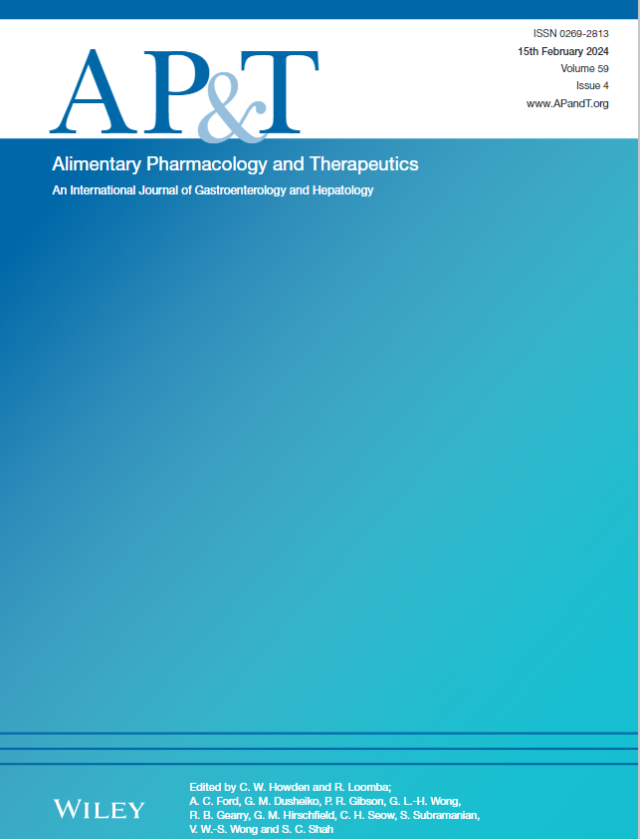il - 23受体多态性是炎症性肠病中抗肿瘤坏死因子-α-诱导的矛盾型牛皮癣的预测因子
IF 6.7
1区 医学
Q1 GASTROENTEROLOGY & HEPATOLOGY
引用次数: 0
摘要
背景:矛盾型牛皮癣(PP)是一种与抗肿瘤坏死因子(TNF)-α治疗相关的药物不良反应,可导致毁容性皮肤病变,影响个体生活质量并影响其炎症性肠病(IBD)治疗。IL-23受体(IL23R)基因多态性与牛皮癣有关,可能与PP有关。目的:在抗tnf α治疗的IBD人群中,评估IL23R1142G>单核苷酸变异与PP发生之间的关系,并评估与PP发展相关的其他临床变量。方法对抗tnf α-暴露的IBD成年患者进行回顾性队列研究,筛选IL23R1142G> a变异基因型,并评估PP的发生情况。参与者还被评估了与PP发展相关的临床变量以及PP对IBD治疗的影响。结果499例患者中,PP发生率为5.1%(29/570),有570例独特的抗tnf α暴露。大多数患者有严重的PP(69.0%),需要停止治疗(69.0%),这导致PP完全消退。IL23R1142G>A变异基因型与PP发展高度相关(46.2% vs. 5.1%, OR = 17.8, 95% CI 7.8-40.0; p < 0.0001)。结论除了临床变量外,il - 23r基因的变异可以识别抗tnf α诱导的PP的发生风险。这一发现的进一步验证可能会促进其作为IBD药物治疗安全交付的临床可操作工具的效用。本文章由计算机程序翻译,如有差异,请以英文原文为准。
IL23 Receptor Polymorphism Is a Predictor of Anti-Tumour Necrosis Factor-α-Induced Paradoxical Psoriasis in Inflammatory Bowel Disease.
BACKGROUND
Paradoxical psoriasis (PP) is an adverse drug reaction associated with anti-tumour necrosis factor (TNF)-α therapy leading to disfiguring skin lesions that may impact an individual's quality of life and affect their inflammatory bowel disease (IBD) care. To date, there are no tools to identify individuals at risk for PP. IL-23 receptor (IL23R) gene polymorphisms have been linked to psoriasis and may be implicated in PP.
AIMS
To evaluate the association between the IL23R1142G>A single nucleotide variant and the occurrence of PP in an anti-TNFα-treated IBD population and assess other clinical variables associated with PP development.
METHODS
In a retrospective cohort study conducted in anti-TNFα-exposed adult patients with IBD, participants were screened for the IL23R1142G>A variant genotype and the occurrence of PP was assessed. Participants were additionally assessed for clinical variables associated with PP development and for the impact of PP on IBD treatment.
RESULTS
Among 499 patients, the incidence of PP was 5.1% (29/570) with 570 unique anti-TNFα exposures. Most patients had severe PP (69.0%) and required treatment cessation (69.0%), which resulted in complete resolution of PP. An IL23R1142G>A variant genotype was highly associated with PP development (46.2% vs. 5.1%, OR = 17.8, 95% CI 7.8-40.0; p < 0.0001). No other clinical variables were associated with the occurrence of PP.
CONCLUSIONS
Variation in the IL23R gene may identify those at risk of anti-TNFα-induced PP, beyond clinical variables. Further validation of this finding may promote its utility as a clinically actionable tool for the safe delivery of IBD medical therapy.
求助全文
通过发布文献求助,成功后即可免费获取论文全文。
去求助
来源期刊
CiteScore
15.60
自引率
7.90%
发文量
527
审稿时长
3-6 weeks
期刊介绍:
Alimentary Pharmacology & Therapeutics is a global pharmacology journal focused on the impact of drugs on the human gastrointestinal and hepato-biliary systems. It covers a diverse range of topics, often with immediate clinical relevance to its readership.

 求助内容:
求助内容: 应助结果提醒方式:
应助结果提醒方式:


